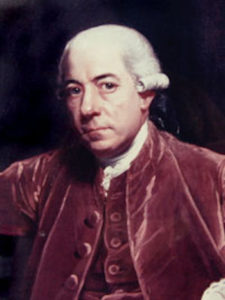
Henry Laurens
*Henry Laurens was born on this date in 1724. He was a white-American merchant, slave trader, and rice planter from South Carolina who became a political leader during the Revolutionary War.
A delegate to the Second Continental Congress, Laurens succeeded John Hancock as President of the Congress. He was a signatory to the Articles of Confederation and President of the Continental Congress when the Articles were passed on November 15, 1777. In the fall of 1779, Congress named Laurens their minister to the Netherlands. In early 1780, he took up that post and successfully negotiated Dutch support for the war. But on his return voyage to Amsterdam that fall, the British frigate Vestal intercepted his ship, the continental packet Mercury, off Newfoundland's banks. Although his dispatches were tossed in the water, they were retrieved by the British, who discovered the draft of a possible U.S.-Dutch treaty prepared in Aix-la-Chapelle in 1778 by William Lee and the Amsterdam banker Jean de Neufville. This prompted Britain to declare war on the Dutch Republic, known as the Fourth Anglo-Dutch War.
The British charged Laurens with treason, transported him to England, and imprisoned him in the Tower of London (he is the only American to have been held prisoner in the Tower). The Americans protested his imprisonment. During his imprisonment, Laurens was assisted by Richard Oswald, his former business partner and the principal owner of Bunce Island, a slave-trading island base in the Sierra Leone River. Oswald argued on Laurens' behalf to the British government. Finally, on December 31, 1781, he was released in exchange for General Lord Cornwallis and completed his voyage to Amsterdam. He helped raise funds for the American effort.
Laurens' oldest son, Colonel John Laurens, was killed in 1782 in the Battle of the Combahee River as one of the last casualties of the Revolutionary War. He had supported enlisting and freeing slaves for the war effort and suggested to his father that he begin with the 40 he stood to inherit. He had urged his father to free the family's slaves, but although conflicted, Henry Laurens never manumitted his 260 slaves.
Laurens had earned great wealth as a partner in the largest slave-trading house in North America, Austin and Laurens. In the 1750s alone, this Charleston firm oversaw the sale of more than 8,000 enslaved Africans. Henry Laurens died on December 8, 1792, at his estate, Mepkin, in South Carolina. In his will, he stated he wished to be cremated, and his ashes are interred at his estate. It is reported that he was the first Caucasian cremation in the United States which he chooses due to a fear of being buried alive. Afterward, the estate passed through several hands. Large portions of the estate still exist and are used today as a Trappist abbey.